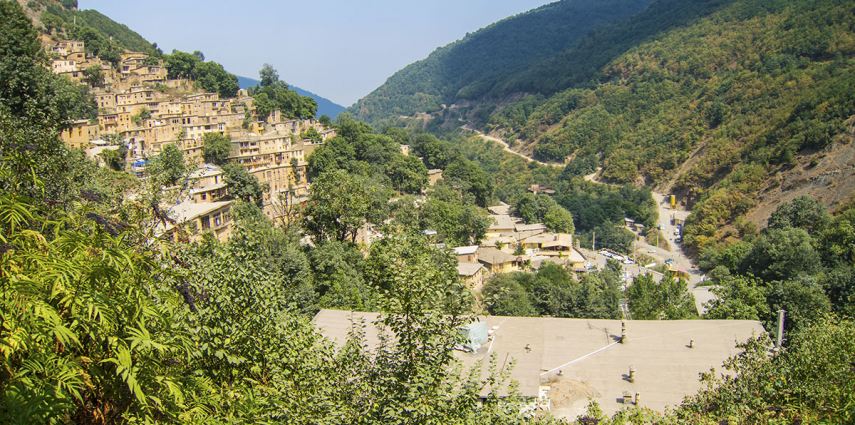The 1000 year-old village of Masuleh
We’ve now been on the road for a month!
We get up early and throw ourselves into traffic (figuratively speaking).
Any hopes from last night that today would see an unexplainable drop in temperature and humidity are dashed by the continuing jungle-like heat.
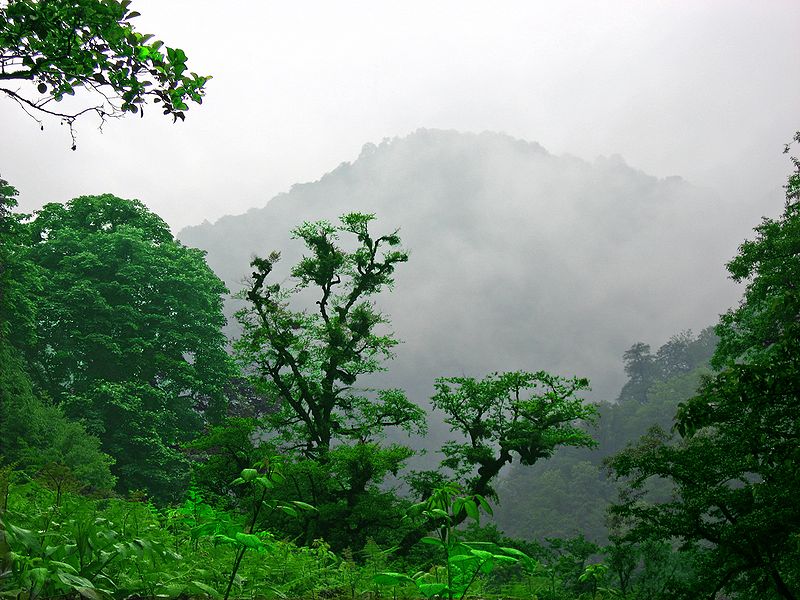
Iran’s northern Caspian Hyrcanian mixed forests
We plan to reach the stepped village of Masuleh today, which is only 200 km or so from Ramsar, but it will take us between 3-4 hours. The village was founded in the 10th century and is situated 1050 meters above sea level in the Alborz mountain range, near the southern coast of the Caspian Sea.
So we’ll be moving from 3266 meters above sea level in the mountains yesterday, to -20 meters (Caspian Sea) and back to 1050 meters again today (Masuleh).
This means interesting roads.
We make a stop about halfway there, in Rasht, where we find ourselves in a small foodstore/restaurant/cupboard where we get one of the best Iranian food-experiences so far. The old man standing behind his pots and pans ladles the chicken, rice, lentils and fresh tomatos on to plates, which we clean quickly and efficiently. Having removed the last speck of food with the delicious Iranian Barbari bread, we feel ready to drive the last couple of hours to Masuleh.
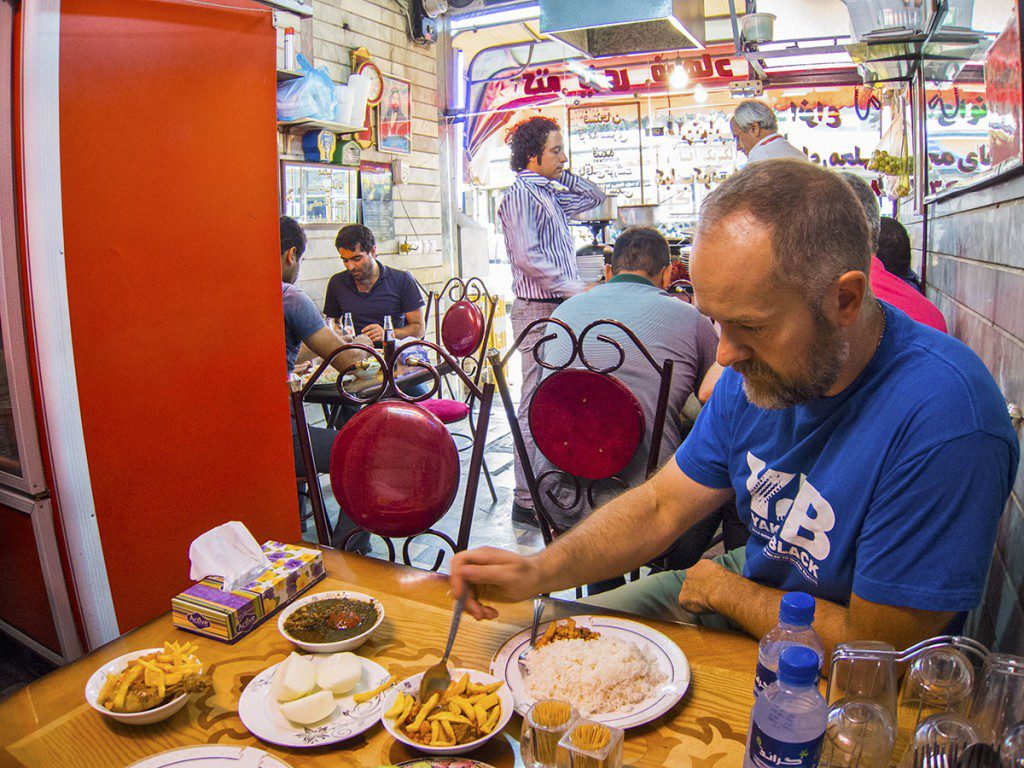
Food in Rasht – inexplicably with added chips
We get to the village after traversing winding roads and picknicking Iranian families everywhere there is shade. When we approach the village, which has a difference in elevation of 100 meters (impressive), we find that we have to pay an admittance fee to get in with our car. Obviously, this is part of the revenue for this place, so we pay the $2 and go on.
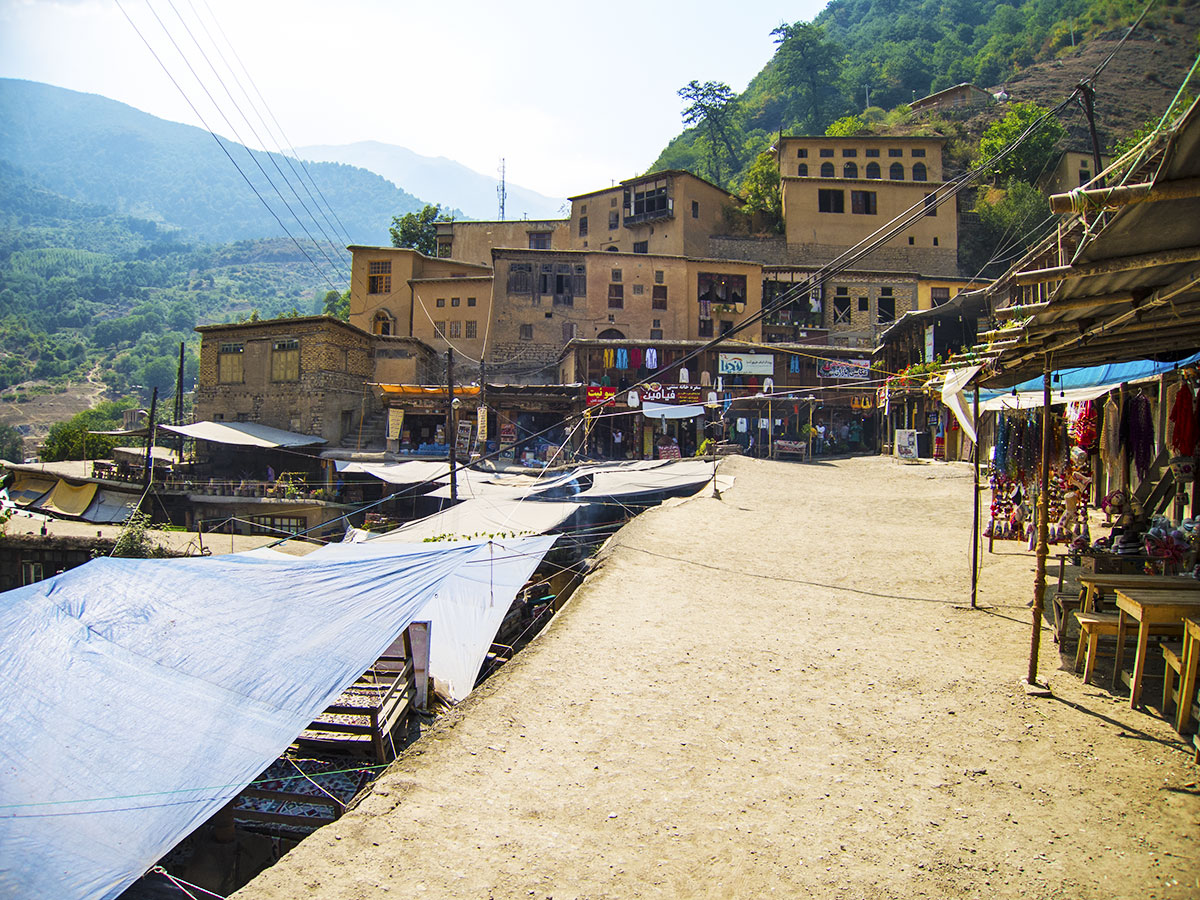
The roofs in Masuleh are the streets
The car barely makes it to the topmost parking space (so that we don’t get heatstroke carrying our gear to the village itself), next to Iranian visitors who have secured their cars with rocks behind the tyres. It’s pretty steep here, but we are confident our handbrake can handle it for one night, so we get out and try to find the place of Mr. Abass Dou Zandeh, our landlord.
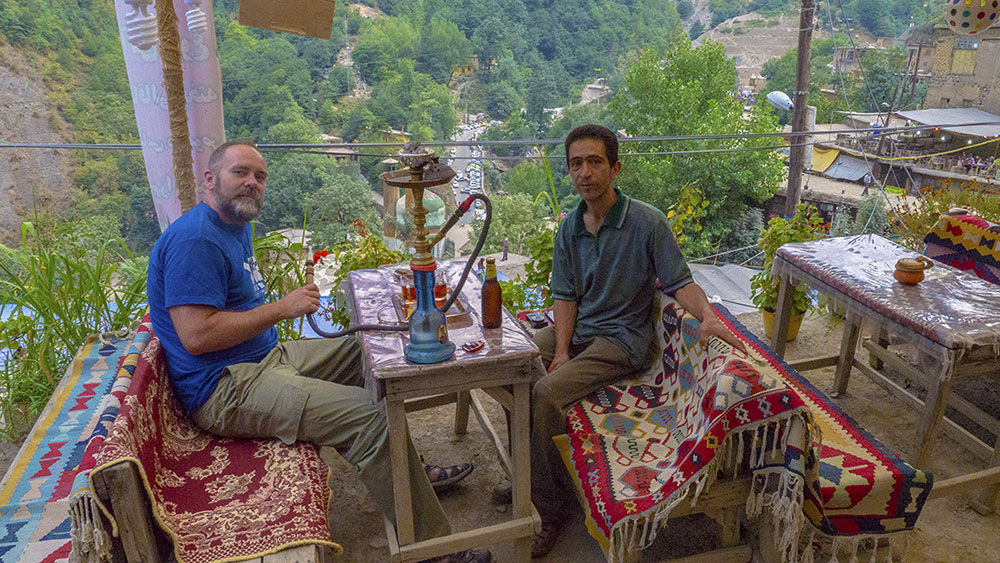
Mr. Abass Dou Zandeh
Luckily, there is someone to ask, and it turns out that we have to drag our stuff to the end of the village. It doesn’t matter, for eventhough it’s hot, the village isn’t all that big with 550 inhabitants spread over 180 families. Mr. Dou Zandeh turns out to speak a couple of words of English, so we get settled in no time in his traditional guesthouse.
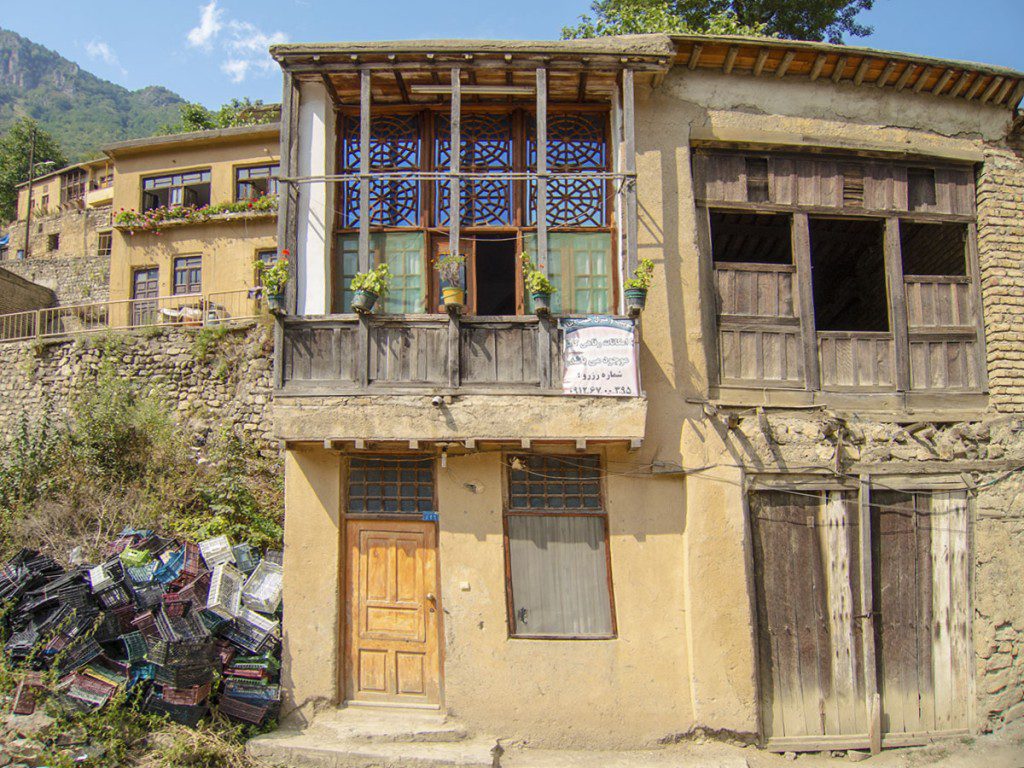
The guesthouse in Masuleh
The room is nice and clean, with Iranian style beds (thick blankets on the floor), a table fan that will have to work overtime, and a bathroom with a shower and the ubiquitous Persian squat toilet.
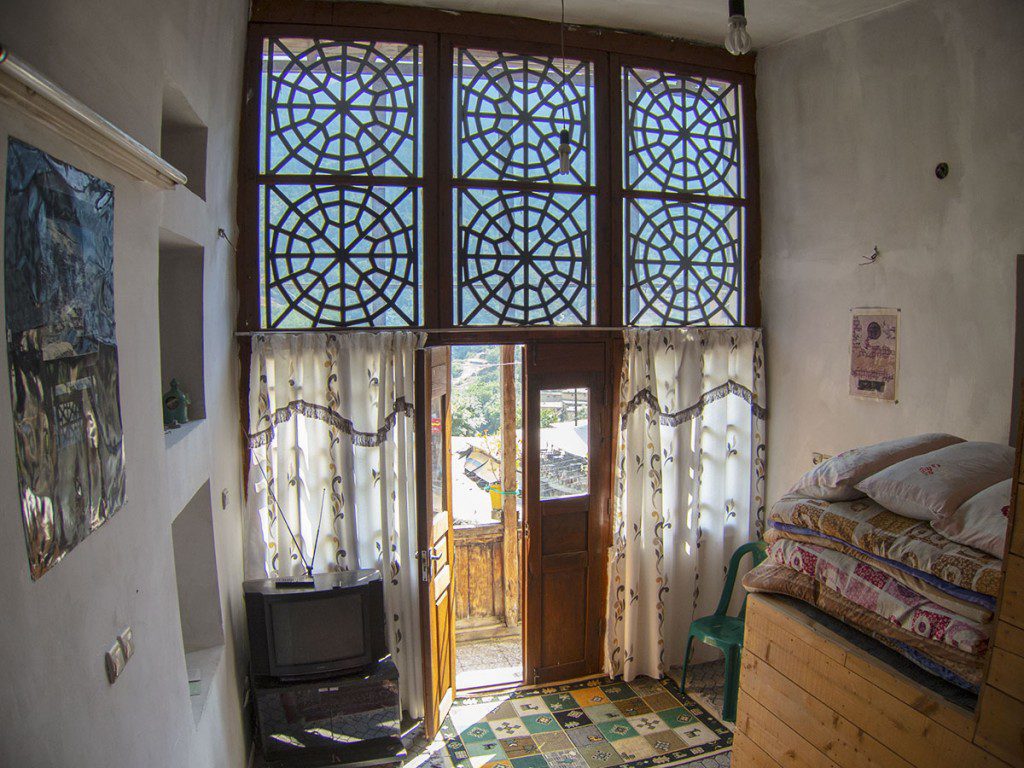
Our room in Masuleh
We start unpacking, but before we go down to the village bazaar we have to do one important thing: it’s Snorre’s 23rd birthday, so Lars has prepared a special treat!
Since it’s quite difficult to get a hold of a birthday cake in these parts, Lars takes a Snickers bar from the coolbox, jams in a match, lights it and sings a few bars of «Happy Birthday To You» before Snorre’s look makes him stop.
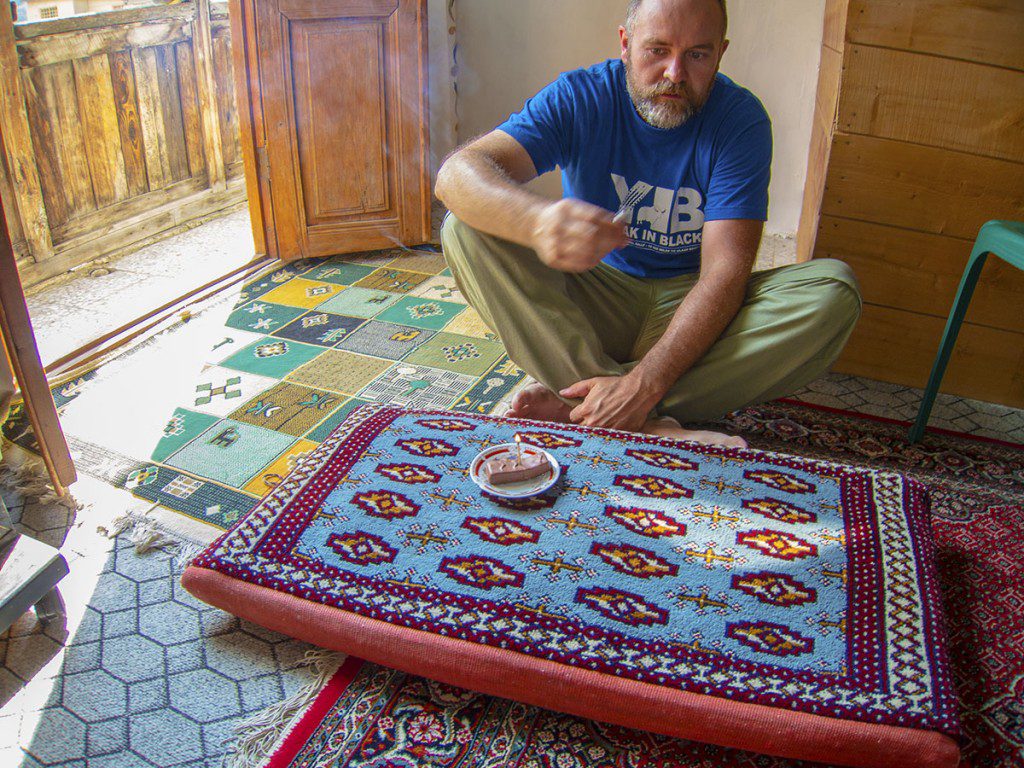
Happy birthday, Snorre
The match is blown out and the Snickers bar is eaten. Time to see what the village has to offer.
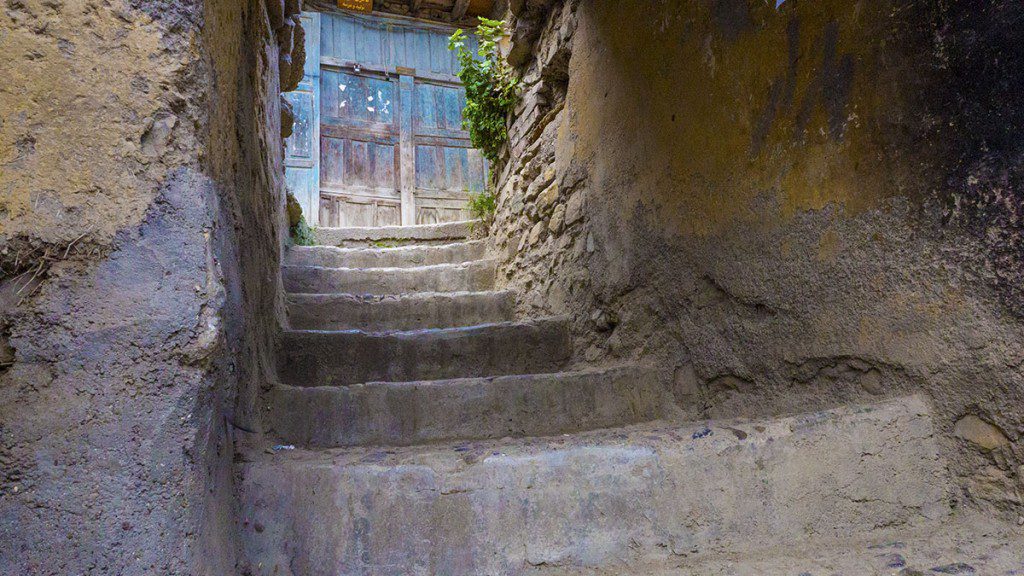
Getting from one level to the next in Masuleh
There aren’t that many tourists, but the ones who are there are Iranian. Apparently Masuleh is a popular weekend-destination, and there are Persian families everywhere. We also see one or two Westerners like us (French? Italian?), but for the most part we are the only exotic specimens here.
We talk to people, or rather, people talk to us, as Iranians always seem to be interested in where we’re from, what we do and so on.
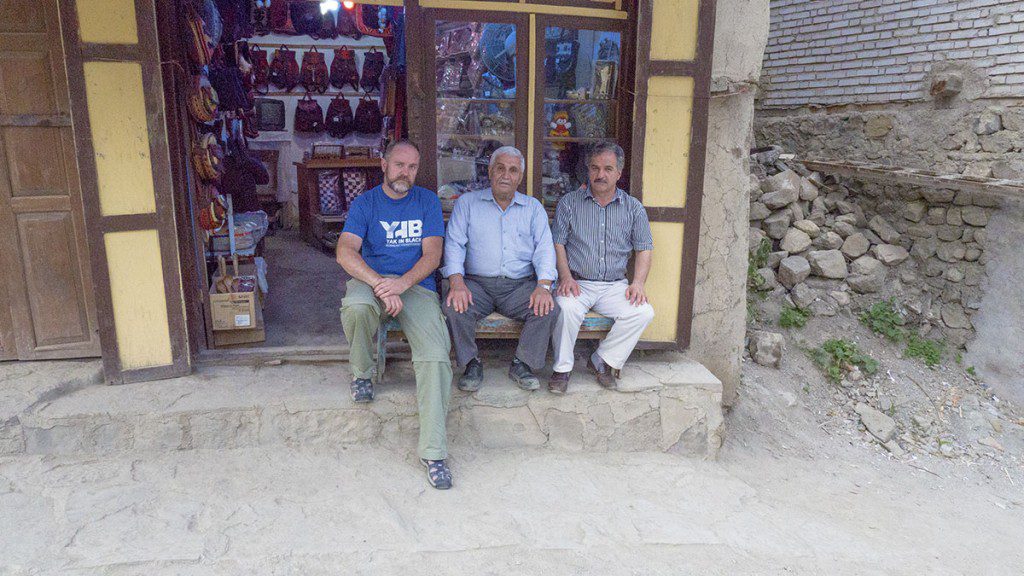
The men of Masuleh
It’s quite interesting to observe how the conversations conform to a set plan, no matter if the other is male, female, young or old. We’ve encountered pretty much the same set of questions everywhere we went in Iran:
- «Hello my friend. Where are you from?» (lifts arm for a mighty handshake).
- «Yes, yes. I am from Iran. How do you like our country?»
- «Everyone friendly in Iran. How old are you?»
- «You look much younger! Are you married?»
- «Why not?» (laughs) «And your profession? Your work?»
- «Good, good! Now, tell me, what you do in Iran?»
- «Really? So, tell me my friend. What country, of all the countries, do you like the best?»
After a while we realized that these were just honest questions from inquisitive Iranians, who really would like to know why someone comes to their country on a holiday. Since it takes time to get a visa, Westerners as tourists are still a rare breed here. We’ll enjoy it while it lasts.
Oh, and absolutely no one knows where Norway is!
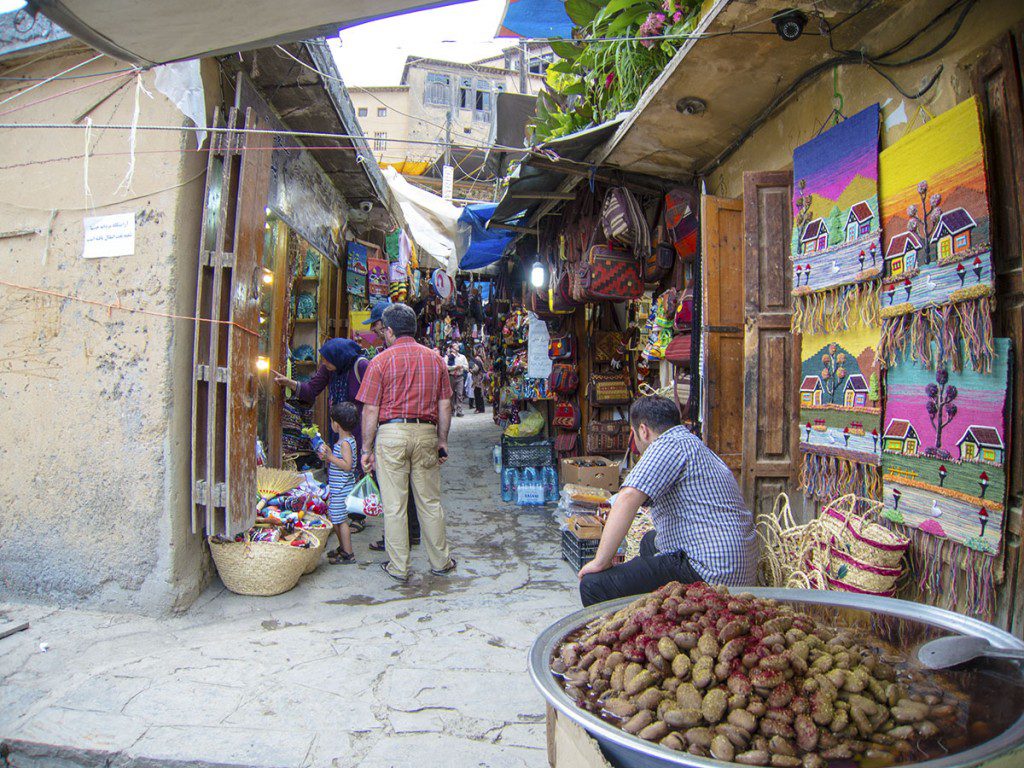
Bazaar in Masuleh
The bazaar is situated on several levels, and people walk on the roofs of the houses below. This seems peculiar, but after ten seconds you forget that you’re traipsing over someones livingroom. We walk through the different levels, and it very quickly becomes apparent that the sale of souvenirs is an important part of the local economy.
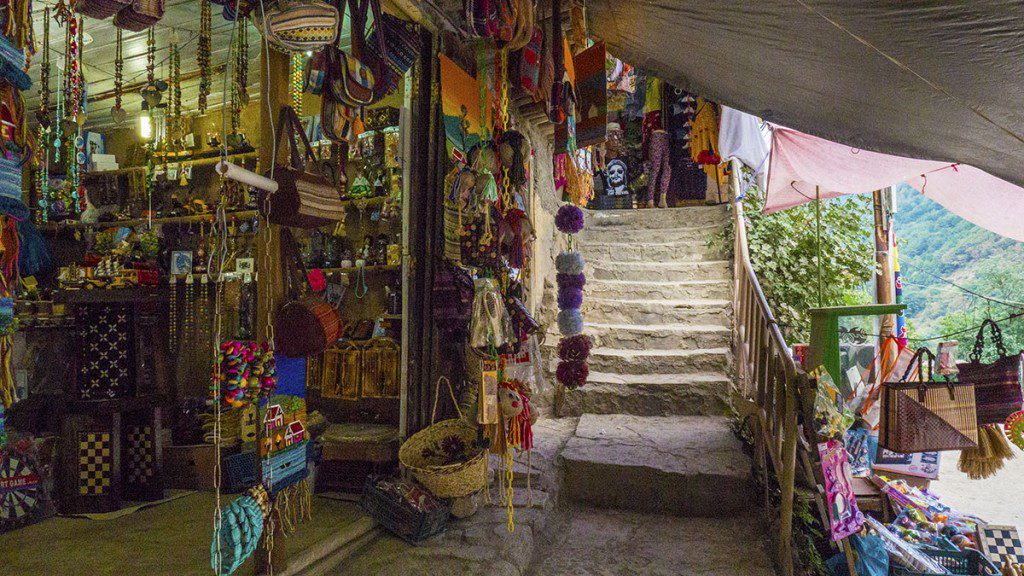
Souvenirs
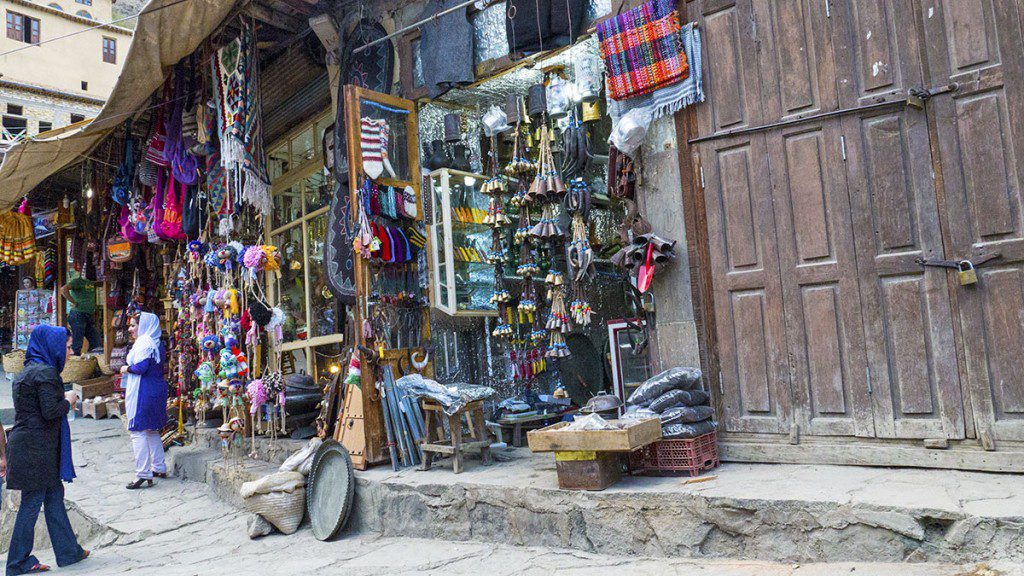
More souvenirs
Unfortunately, progress has come to Masuleh as well. By «progress», we mean the fact that 95% of all the souvenirs sold in Masuleh were made either in China, India or Turkey.
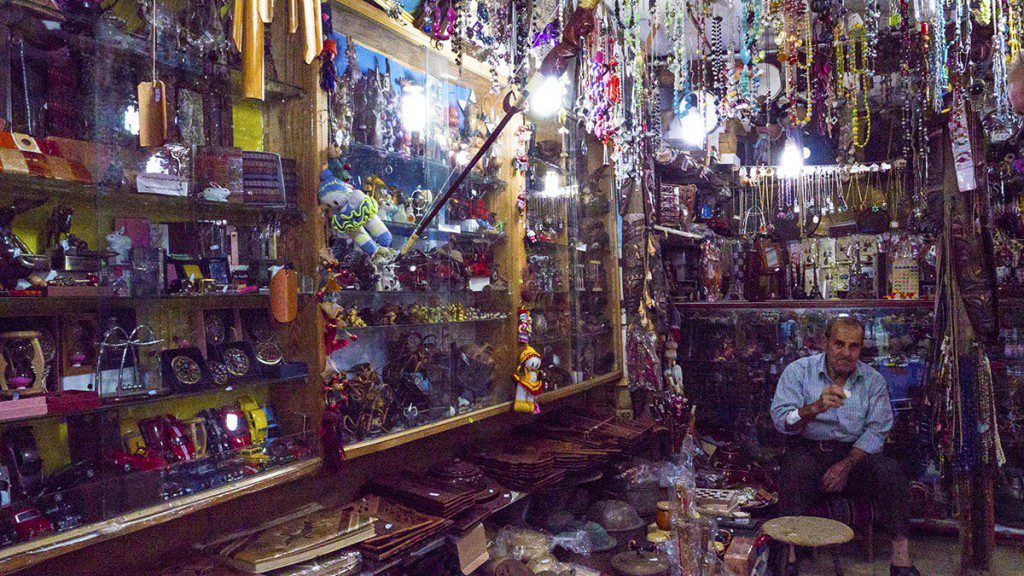
Even more souvenirs
Through sheer luck, and the fact that we wanted to go even higher up, we stumbled on one of the few local artists who makes lovely things out of clay, ceramics and the like. Local souvenirs, hoohoooo!
Let’s just say we both bought a few things 😉
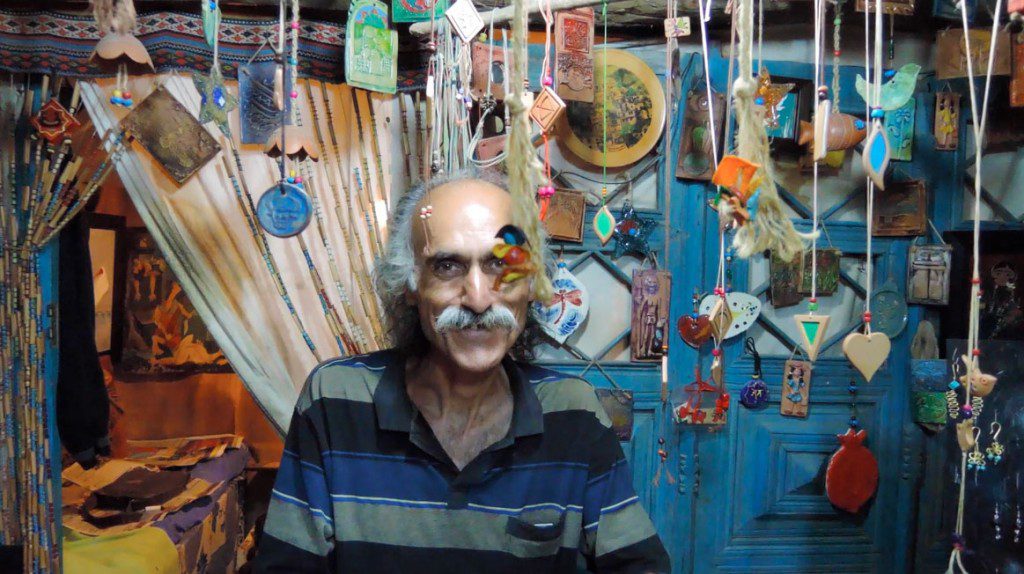
The artist in his shop
It starts to get dark, and we decide to have some food and tea. Mr. Abass Dou Zandeh prepares a narghile for Snorre and some tea, as we wait for our food to arrive.
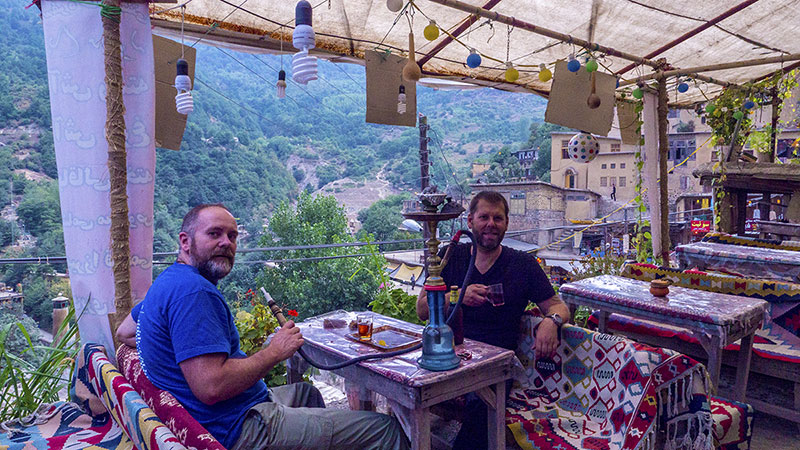
In the tea-house
As it gets steadily darker, we again venture forth among the stalls and souvenir shops. The stall owners seem to stay open as long as people are out and about. This is fine by us, since now we get to see the Persian tourists in their natural habitat.
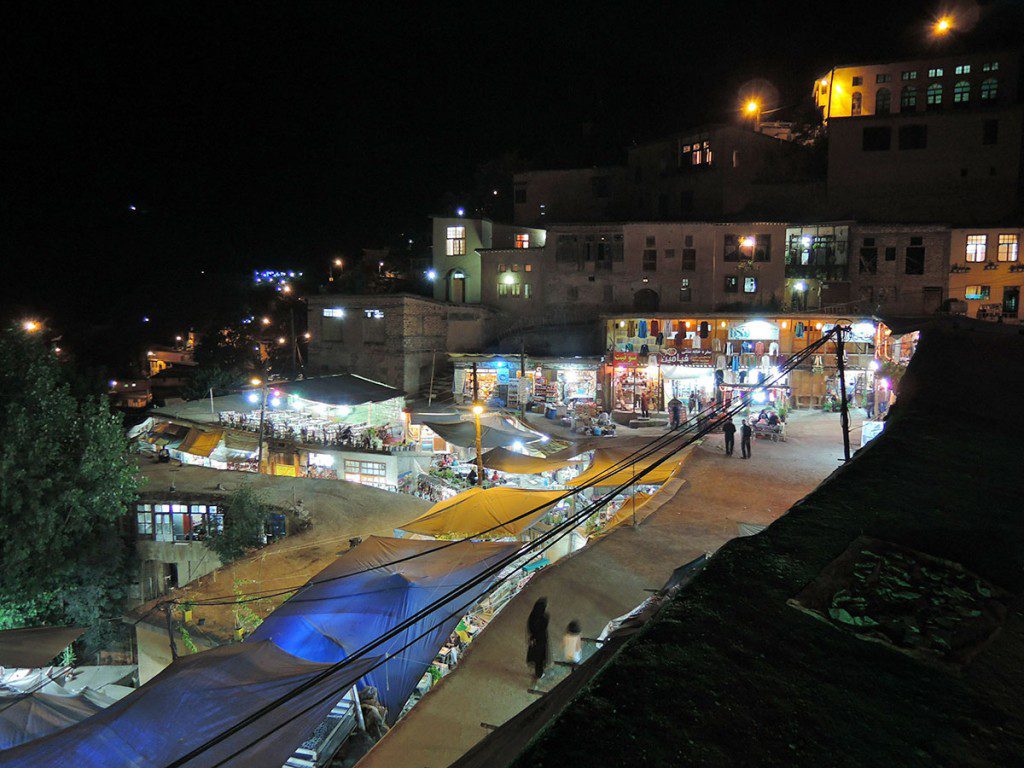
Masuleh by night
It turns out they do pretty much the same thing as people on holiday all over the world: go to an open restaurant or tea-house and sit and talk. So that’s what we do as well.
It takes only a few minutes of sitting, before a young boy comes up to us and starts asking us the familiar questions (where are you from? how do you like Iran? how old are you?), and we answer like the seasoned professionals that we have become.
After a while his extended family, 8-10 people who had been drinking tea and eating ice cream nearby, start joining in the conversation. Several of them speak English, although Hosein, the young boy, is a prodigy. He translates questions from his aunts, uncles and sisters for us to answer (how old are you? what do you work? are you married?) and answers our own (why aren’t you married? you are 12? that explains it, then).
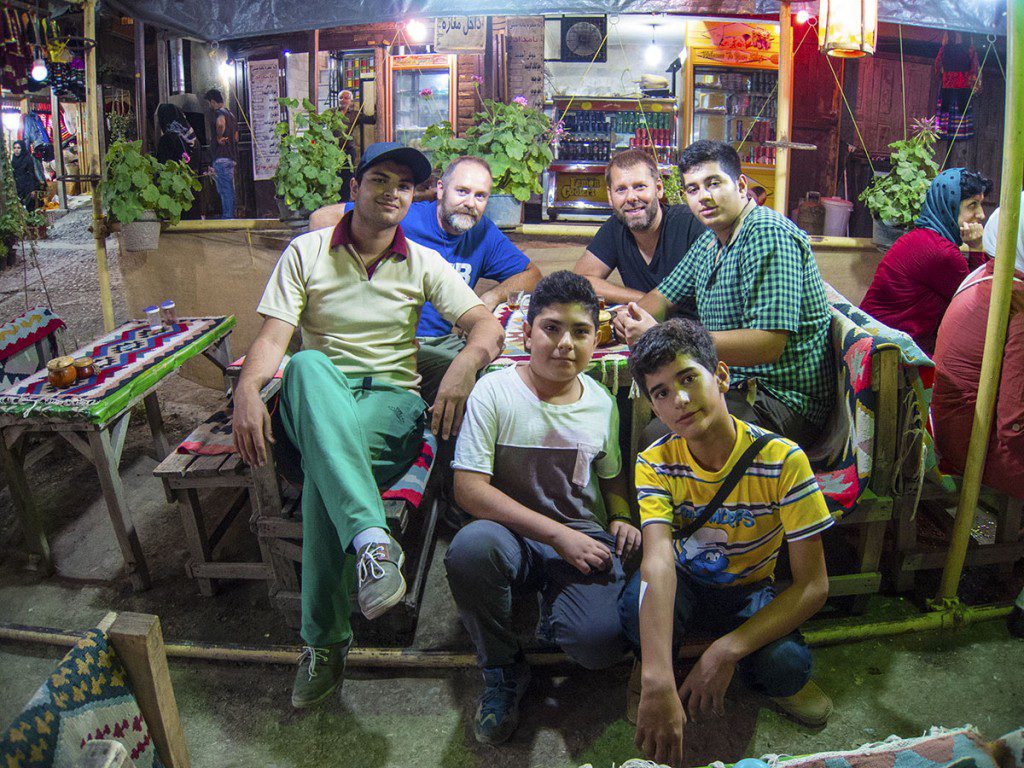
Hosein and the part of his family that could fit in the photo
After an hour of this everyone is exhausted, but at least is in the clear as to what everyone else’s profession is. We retire to our tea-house and settle down for some bird-watching, or in Snorre’s case, writing postcards.
It’s been a great day with lots of impressions, but none so unforgettable as a family of 15 people being overjoyed that two Westerners wanted to talk to them.
This, apparently, doesn’t happen too often.
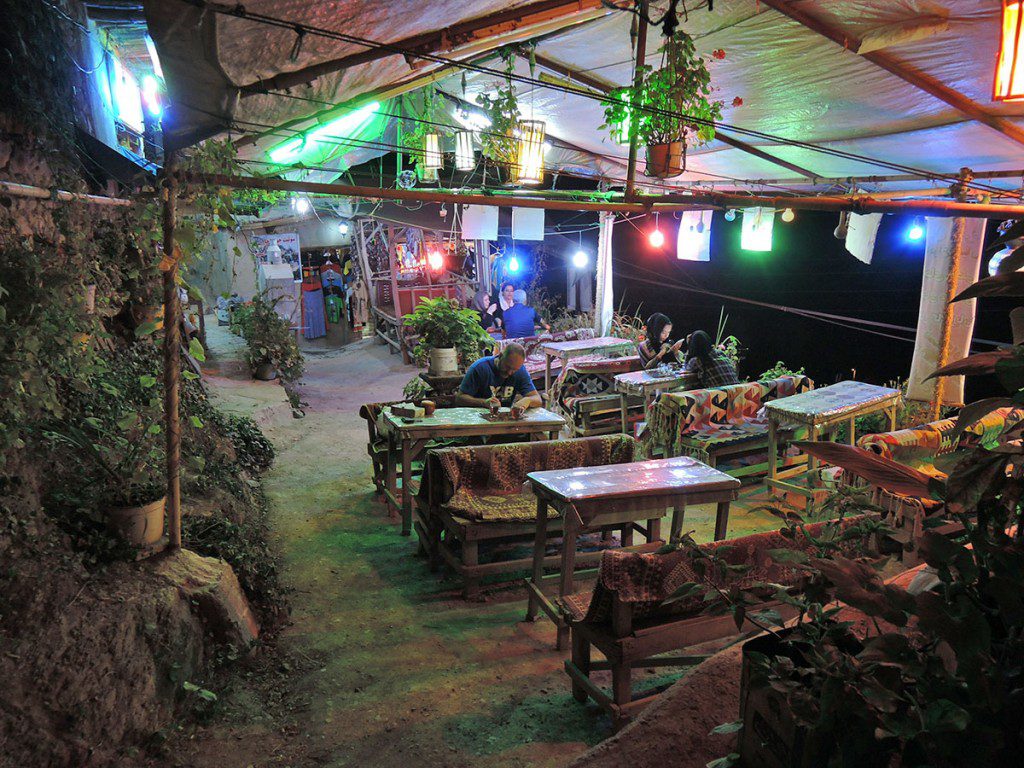
With some luck, the postcards will make it home only a couple of weeks after Snorre
Today we went from the coast of the Caspian Sea to the Aborz mountains, which only amounted to 181 km.
Check this out

